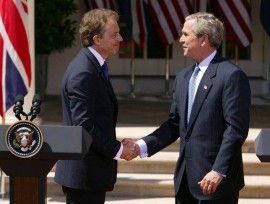
One of Tony Blair’s better lines in his evidence to the Chilcot inquiry on 29 January was that one should not ask the 2003 question about Iraq – how much of a threat was Saddam Hussein then? – but rather the 2010 question: how much of a threat would Saddam Hussein be now if he were still in power. This is all part of his mission to convince the world that his 2003 course of action was the right one. (There are critics who will say that Tony Blair himself actually answered his 2003 question in 2001 or 2002, but that is for another blog.)
Here, I want to pick up on the other half of his mission at Chilcot, which is to convince the world that Iran now is the kind of threat that Iraq was said to be then. Partly, this is because he is concerned about Iran, and partly because he wants to promote the idea that there are countries that need to be dealt with because they pose aggressive threats to their neighbours. If this idea becomes more commonly held, he might make it more likely that people will think that his view of Iraq was the correct one.
But Tony Blair is asking the 2010 question about Iran. What would have been the answer to the 2003 question?
In his State of the Union address in January 2002, George W Bush famously lumped Iran together with Iraq and North Korea in the “axis of evil”, lining them all up as threats and potential enemies. While that speech was delivered to Congress and aimed at the American people, it was also heard around the world, and particularly in Iran, Iraq and North Korea. Denouncing a country in those terms might not be the best way to encourage it to cooperate.
As far as Iraq and North Korea were concerned, that may not have mattered too much, given the solid dictatorial regimes that were in place. But Iran was a very different matter. It was not a political monolith. There were different political factions within that country, and there was a contest between them for power. What has been the impact of Anglo-American policy on that contest?
On one side in Iran, there were those that argued for better relations with America. That way, the Iranian economy could benefit from trade and investment while nevertheless preserving and adapting the values of the revolution. The hardline faction, by contrast, rejected this, believing that America was an implacable opponent of the Iranian revolution and that there was no possibility of an accommodation with it. The occasional American talk of the pursuit of better relations was just that, talk, and there was no purpose in seeking compromise or agreement.
It would have been a smart strategy on the part of the Americans to have sought to strengthen the realos in the Iranian government in their struggle with the fundis. Such a strategy would have been composed of making and keeping promises to show that they could be trusted and that an Iranian attitude of engagement would be met with an equal response. As it turned out, though, the Americans did something different. They showed what their talk of finding peaceful solutions to disputes was worth by their evident desire for war with Iraq, come what may. The idea that they could reach and stick to peaceful agreements was dealt a severe blow, along with the credibility and influence of the realo faction within the Iranian government. The Americans lost their potential partner for peace.
It is becoming apparent in the past year or so what this means within Iran itself. Think about the presidential election last summer, and the apparent contest between realo and fundi candidates. I write “apparent”, because the re-election of President Ahmedinejad was achieved by unfair means. I write “contest” because, even at the time, the ability of the fundis to cheat and win in this way was not quite understood by the Iranian people: many of them believed that the outcome might be determined fairly. Such large crowds would not have taken to the streets in outrage if they had already resigned themselves to defeat or a shamelessly rigged election – there were no protests on the streets in East Berlin during the years when the Communists won 99 per cent of the vote. No, the genuine shock on the part of the demonstrators and the attempt to overturn or resist the vote-rigging shows that even as late as last summer, there was still genuine uncertainty as to the real nature of the Iranian regime, but the ability of the state machinery to suppress those attempts shows how power has shifted within the regime towards the fundis and away from the potential friends of the west.
My conclusion from this is that one cannot look at policy towards Iraq and policy towards Iran as if they could be treated separately. One of the reasons why Iran is so difficult to deal with now is that the Iranian government has seen what happens to regimes that cooperate with American demands for disarmament: they get invaded and destroyed in any case. In which case, why cooperate?
After the Iranian revolution in 1979, President Jimmy Carter was famously denounced in America for having “lost Iran”. As relations with Iran now deteriorate and stay bad, perhaps we can look at the policies of Bush and Blair in Iraq as contributing to having “lost Iran” again.
